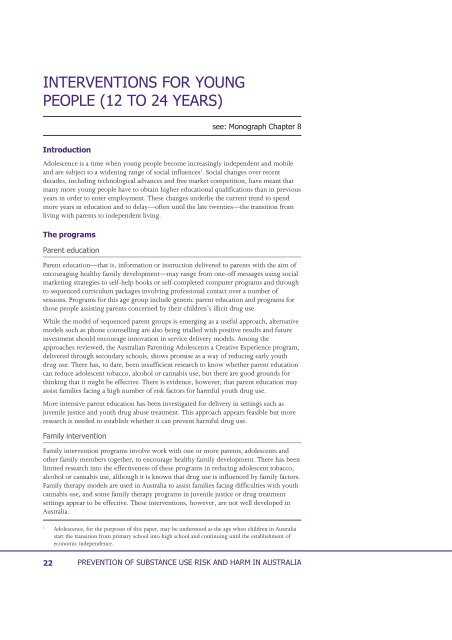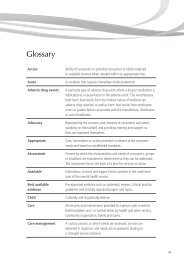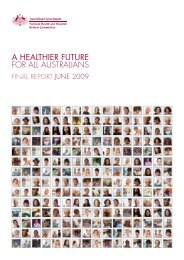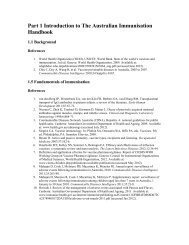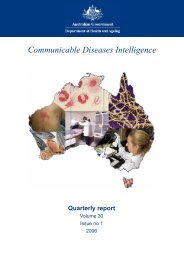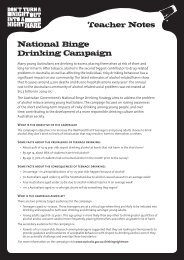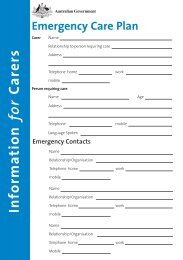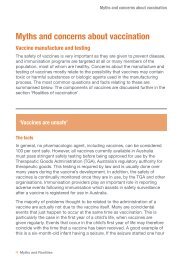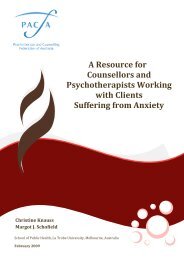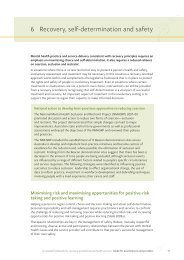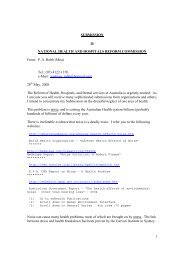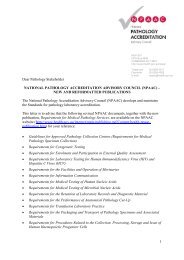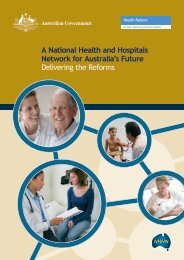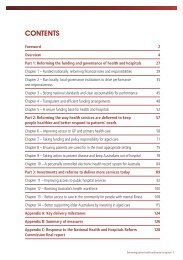Summary - Department of Health and Ageing
Summary - Department of Health and Ageing
Summary - Department of Health and Ageing
Create successful ePaper yourself
Turn your PDF publications into a flip-book with our unique Google optimized e-Paper software.
Adolescence is a time when young people become increasingly independent <strong>and</strong> mobile<br />
<strong>and</strong> are subject to a widening range <strong>of</strong> social influences 1 . Social changes over recent<br />
decades, including technological advances <strong>and</strong> free market competition, have meant that<br />
many more young people have to obtain higher educational qualifications than in previous<br />
years in order to enter employment. These changes underlie the current trend to spend<br />
more years in education <strong>and</strong> to delay—<strong>of</strong>ten until the late twenties—the transition from<br />
living with parents to independent living.<br />
<br />
<br />
Parent education—that is, information or instruction delivered to parents with the aim <strong>of</strong><br />
encouraging healthy family development—may range from one-<strong>of</strong>f messages using social<br />
marketing strategies to self-help books or self-completed computer programs <strong>and</strong> through<br />
to sequenced curriculum packages involving pr<strong>of</strong>essional contact over a number <strong>of</strong><br />
sessions. Programs for this age group include generic parent education <strong>and</strong> programs for<br />
those people assisting parents concerned by their children’s illicit drug use.<br />
While the model <strong>of</strong> sequenced parent groups is emerging as a useful approach, alternative<br />
models such as phone counselling are also being trialled with positive results <strong>and</strong> future<br />
investment should encourage innovation in service delivery models. Among the<br />
approaches reviewed, the Australian Parenting Adolescents a Creative Experience program,<br />
delivered through secondary schools, shows promise as a way <strong>of</strong> reducing early youth<br />
drug use. There has, to date, been insufficient research to know whether parent education<br />
can reduce adolescent tobacco, alcohol or cannabis use, but there are good grounds for<br />
thinking that it might be effective. There is evidence, however, that parent education may<br />
assist families facing a high number <strong>of</strong> risk factors for harmful youth drug use.<br />
More intensive parent education has been investigated for delivery in settings such as<br />
juvenile justice <strong>and</strong> youth drug abuse treatment. This approach appears feasible but more<br />
research is needed to establish whether it can prevent harmful drug use.<br />
<br />
Family intervention programs involve work with one or more parents, adolescents <strong>and</strong><br />
other family members together, to encourage healthy family development. There has been<br />
limited research into the effectiveness <strong>of</strong> these programs in reducing adolescent tobacco,<br />
alcohol or cannabis use, although it is known that drug use is influenced by family factors.<br />
Family therapy models are used in Australia to assist families facing difficulties with youth<br />
cannabis use, <strong>and</strong> some family therapy programs in juvenile justice or drug treatment<br />
settings appear to be effective. These interventions, however, are not well developed in<br />
Australia.<br />
1<br />
Adolescence, for the purposes <strong>of</strong> this paper, may be understood as the age when children in Australia<br />
start the transition from primary school into high school <strong>and</strong> continuing until the establishment <strong>of</strong><br />
economic independence.


